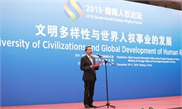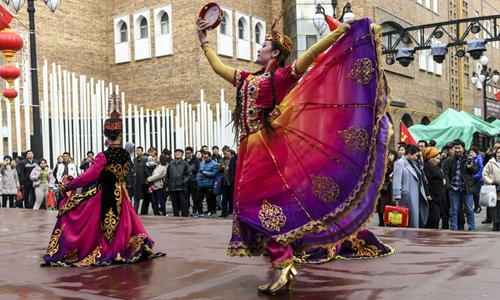
Photo:Screengrab of CGTN
China's
state broadcasters consecutively aired three documentaries from
Thursday illustrating the anti-terrorism efforts in Northwest China's
Xinjiang
Uyghur Autonomous Region, a terrorist organization East Turkistan
Islamic Movement's (ETIM) role in plotting terrorist attacks in China
and US hypocrisy on human rights issues. The documentaries sparked wide
discussions on domestic and overseas media.
Many netizens
commented that the documentaries disclosed rare video footage on
terrorist attacks that Xinjiang had suffered, fully reflecting the
severe threat of terrorism Xinjiang was facing. They also said Western
media that criticized China's Xinjiang policies should watch these
videos carefully.
But many Western media, especially those which
tried to hype the "leaked documents" on vocational education and
training centers in Xinjiang in recent weeks, kept silent over the
heated discussions on the Chinese mainland generated by the
documentaries.
Chinese mainland experts said that some Western
media outlets selectively report what fits their stereotypes and
interests. These outlets also went great lengths to slander on Xinjiang.
Their silence on the documentaries showed their double standards in
regards to China's Xinjiang issues, they said.
Two of the three
documentaries were newly made and aired on CGTN on Thursday and Saturday
respectively, telling of the overall counter-terrorism work in Xinjiang
and ETIM's role in inciting terrorist attacks in China's Xinjiang and
other Chinese cities.
One documentary, initially aired in April
2018, was streamed again on CGTN on Friday night, deploring the human
rights crisis created by the US in the Middle East since 2003.
Topics
of "New documentaries on Xinjiang's anti-terrorism work" and "Unveiling
the black hand behind Xinjiang's terrorism" were viewed 390 million
times and 230 million times respectively on Sina Weibo, China's
Twitter-like social media.
CGTN also uploaded these two
documentaries on YouTube and the first episode, "Fighting terrorism in
Xinjiang" was watched more than 150,000 times.
Some internet
users commented on Sina Weibo that they had visited Xinjiang and enjoyed
the splendid landscape, friendly atmosphere and safety, but they had no
idea that Xinjiang used to suffer such grim terrorism and extremism
threats.
Leonard Brownies, one internet user from abroad
commented on Twitter after watching one documentary that "This is FACT.
Some stupid Western fake news media should see this."
The
documentaries were "very touching and reflect truth on Xinjiang in a
clear way," Erkin Oncan, a Turkish reporter, told the Global Times on
Sunday.
"Unlike the Western propaganda news, the documentaries
tell what was really happening in Xinjiang by original videos and
remarks of witnesses and participants of terrorist attacks."

Photo: Screengrab of CGTN
Pretending to be blind
Few Western media outlets reported discussions about the documentaries on the Chinese internet as of press time.
This
is in sharp contrast to extensive coverage by Western media such as the
17 media partners of the International Consortium of Investigative
Journalists (ICIJ) on "leaked government files" on Xinjiang.
Erkin
said that he was not surprised to see many Western media "pretend to be
blind" at the Chinese documentaries as their reports on Xinjiang were
in line with "some Western countries' political agenda, not with the
principles of journalism."
By making public rare video footage
of terrorist attacks including the Urumqi riots on July 5, 2009 and the
Tiananmen Square terror attack on October 28, 2013, "the documentaries
tear the hypocrisy mask off the US," said Li Wei, a counter-terrorism
expert at the China Institutes of Contemporary International Relations
in Beijing.
"It claims to protect human rights but supports terrorist groups and interferes in China's domestic affairs."
For
some Western media and US politicians, who know clearly the previous
severe terrorist threat in Xinjiang and still chose to smear China's
anti-terrorism policies in the region, they would ignore the
documentaries on purpose, Li asserted.
"They give no care to the truth but want to hype Xinjiang issue to make troubles for China," he said..
"These
documentaries disclosed many rare and original video footages of
terrorist attacks happened in Xinjiang and other cities in China. China
used to release some information on terrorist attacks but images of the
documentaries are more powerful than words."
Li said that the
bloody scenes of terrorist attacks, the cruelty of terrorists and the
tragedy of innocent people's deaths not only left a strong impression on
the audience but also reminded people the hefty price the regional
government and local people have paid for restoring peace and stability
in Xinjiang.
Li told the Global Times that these documentaries
target people who were fooled by fake news of some Western media but
wanted to know true stories of Xinjiang.
"I believe that people
who have conscience would get to know and give just comment on China's
strenuous efforts on countering terrorism and on protecting local
residents' human rights in Xinjiang," said Li.
China's approach has been in consonance with the real
protection of human rights by conforming to the rule of law,
guaranteeing better livelihood, and ensuring the right to survive and
develop of every terrorist and extremist who can be saved. This is the
best response to groundless condemnation by the US-led Western world.














